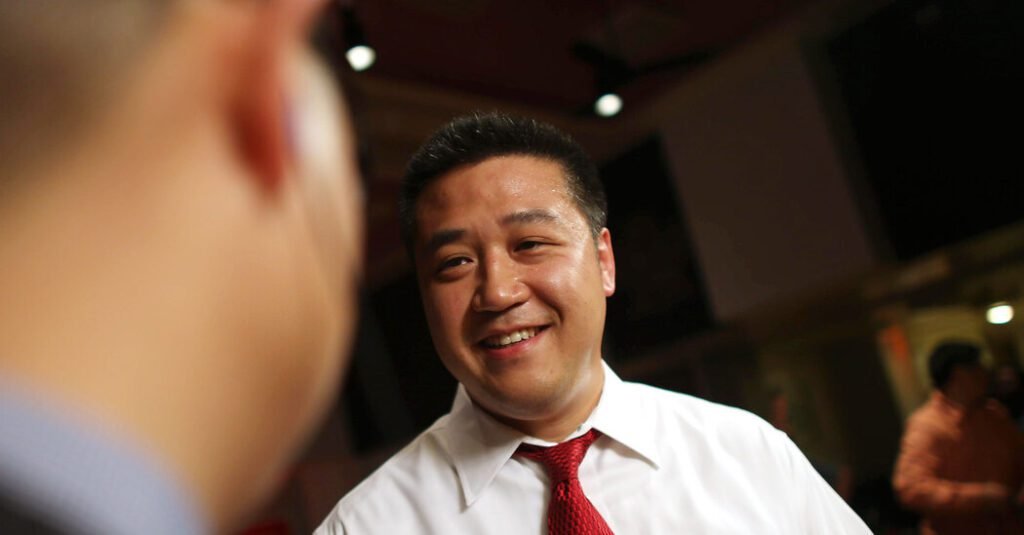A member of Canada’s parliament testified Tuesday that high school students from China were bused in to vote for him in a party election at the center of a federal investigation into meddling in Canadian elections by China and other foreign countries.
Testifying during a public hearing in Ottawa, MP Han Dong, a Chinese-Canadian politician formerly with Prime Minister Justin Trudeau’s Liberal Party, said he had met with and solicited the support of students from a private high school in 2019, but that he did not know who had chartered or paid for the bus on election day.
A Canadian intelligence report revealed during the hearing said there was evidence that a “known proxy agent” of the Chinese Consulate had provided the students with “falsified documents to allow them to vote” even though they did not reside in the constituency of Mr. .Dong.
Non-citizens over the age of 14 can register and vote in party elections if they can prove they live in an electoral district.
According to the report, there were also indications that the Chinese consulate had coerced the students into supporting Mr. Dong by issuing “veiled threats” about their visas and their families back in China.
The Chinese embassy has repeatedly denied meddling in Canadian politics.
Mr. Dong’s testimony was part of an ongoing federal investigation into foreign interference in Canada’s political system, specifically the 2019 and 2021 general elections. The investigation followed a series of leaks to Canadian media that showed the Chinese government had intervened in both elections by supporting candidates favorable to its policies and undermining its critics.
Tuesday’s public hearing before a panel appointed by Mr. Trudeau featured political officials directly involved in the 2019 and 2021 elections for the first time.
Mr. Dong has denied receiving help from the Chinese government during his campaign for parliament in Canada’s 2019 general election. Asked if he believes the Chinese government has interfered in Canadian politics, Mr. Dong said: “No I have never seen any evidence of it.’ When pressed, he added, “It’s possible.”
In recent years, Canadian intelligence officials have issued public warnings about China’s intensifying efforts to influence votes in the populous suburbs of Toronto and Vancouver, home to Canada’s largest Chinese diasporas.
Under President Xi Jinping’s aggressive foreign policy, China has leveraged its diasporas around the world to try to influence local politics, according to intelligence officials, academics and members of the diaspora. Other states such as Australia have tried to limit China’s influence, including by creating a foreign agent registry.
Canada under Mr. Trudeau’s government — whose Liberal Party candidates were generally favored by China, according to Canadian media — has long faced criticism for not doing enough to combat foreign interference.
Mr. Trudeau has steadfastly opposed a public inquiry into the matter but, facing mounting opposition attacks and media leaks, agreed to one in September.
On Tuesday, the Liberals’ 2021 national campaign manager, Azam Ismael, testified that the issue of foreign interference was “low on the radar” in 2021.
But much of Tuesday was devoted to Mr. Dong’s 2019 party election in his Toronto constituency of Don Valley North ahead of that year’s general election.
The outcome of the party race was significant because the constituency was a Liberal stronghold and the winner was almost certain to become a member of its parliament.
Party elections in that district became the focus of the investigation after Canadian media, citing leaks, reported that Mr. Dong had received help from the Chinese consulate in Toronto.
A government-appointed special rapporteur said last year that the party election was marred by “irregularities”, including the “importation of people and students” and that there was “reasonable suspicion” that Mr Dong had benefited from the consulate. support.
In an interview with federal investigating officials in February, Mr. Dong did not mention the students who had been bused. He acknowledged the fact for the first time in a written submission to inquiry officials on Monday, a day before his deposition. He did it, he said, after his wife “reminded” him.
Political scientists said the Liberal and other party nomination process was susceptible to foreign manipulation.
But Mr Ismail, the Liberal campaign director, said the party’s nomination process was “rigorous”, adding that he did not believe it was “vulnerable to foreign interference”.
On Tuesday, a lawyer representing an opposition lawmaker noted that even foreign students on “a one-year study program” could vote in party elections.
And a lawyer for a human rights group pointed out during Tuesday’s hearing that authoritarian governments can force foreign students or members of the diaspora to vote a certain way through various means, including monitoring cellphones and social media.
Would this fear “make members of diaspora communities vulnerable to coercion in a nomination race?” the lawyer asked Mr. Ismail.
Mr Ismail said he had not considered this “deeply”, but added: “I would think so, yes.”
The commission of inquiry, chaired by Marie-Josée Hogue, a Superior Court judge from Quebec, is expected to issue a preliminary report in May and a final one in December.
The Chinese government is leading other nations to meddle in Canadian politics, according to an intelligence briefing revealed during the hearings. But concerns about involvement widened last year when Mr. Trudeau accused Indian government agents of killing a Canadian Sikh leader in Vancouver.

